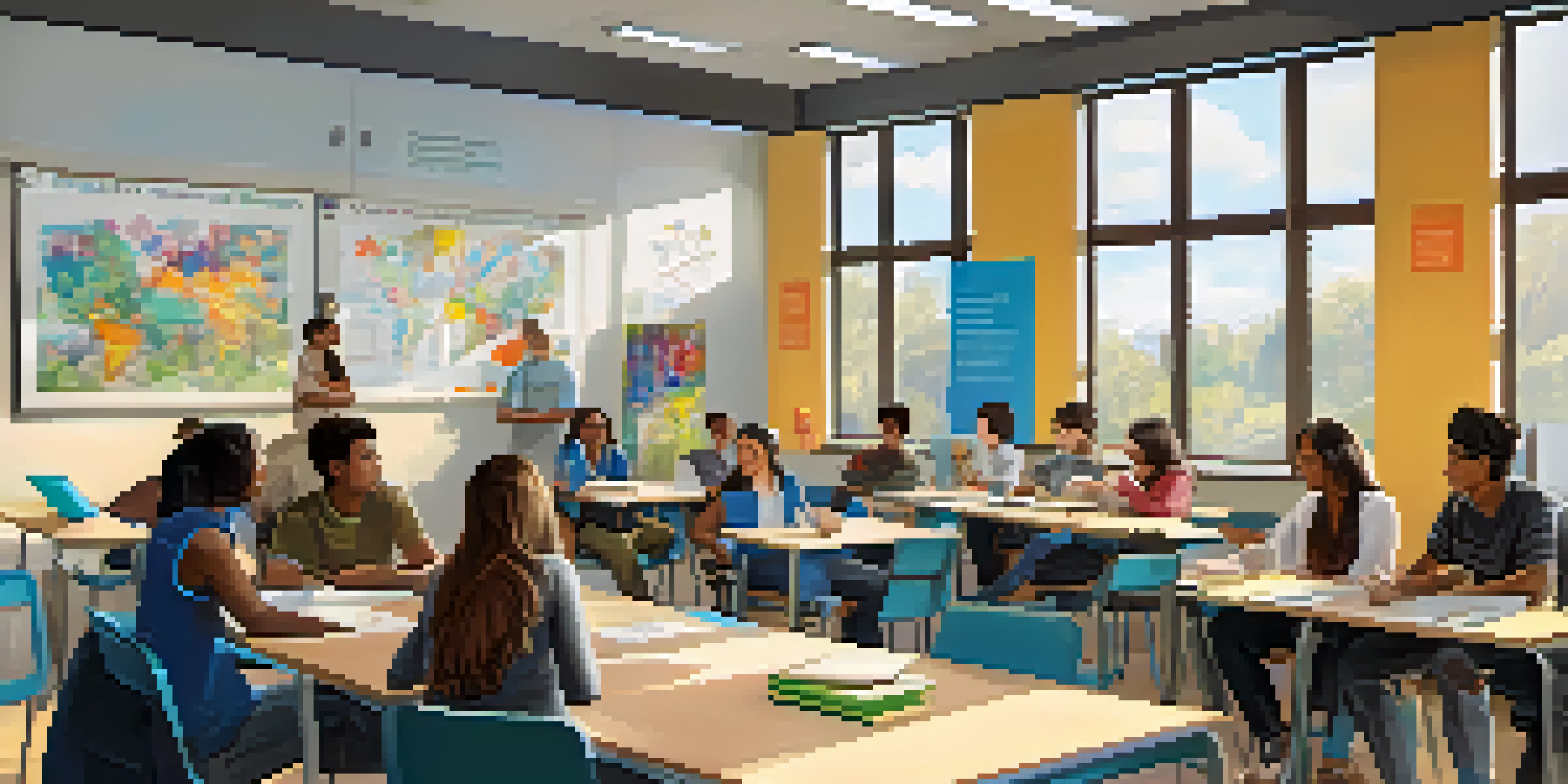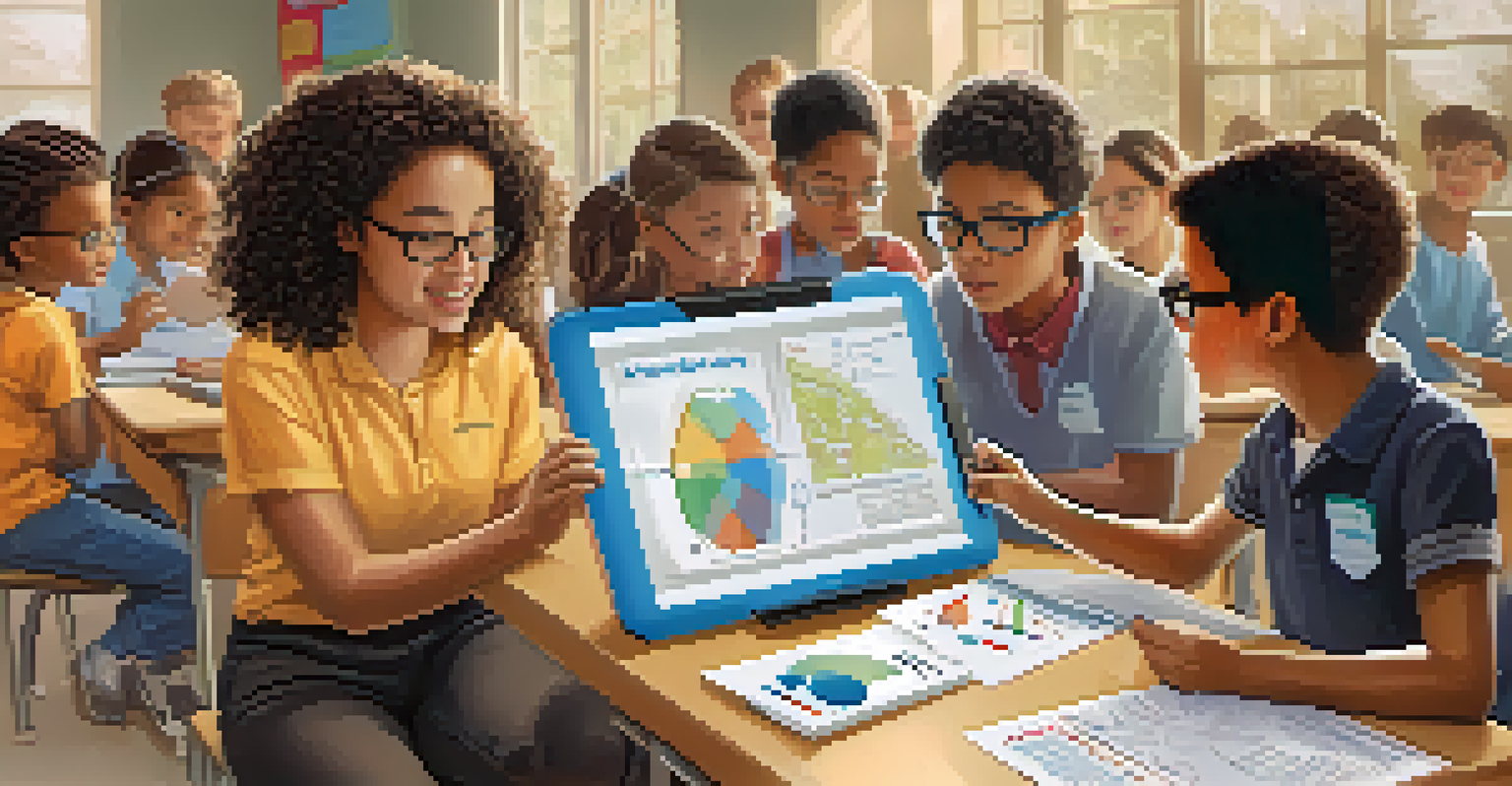Critical Thinking Skills and Cognitive Development in Education

Understanding Critical Thinking in Education
Critical thinking is the ability to analyze, evaluate, and synthesize information. In an educational context, it empowers students to question assumptions and develop reasoned arguments. This skill is crucial as it helps learners navigate complex problems and make informed decisions.
The mind is not a vessel to be filled, but a fire to be kindled.
For instance, when a student is tasked with a research project, critical thinking enables them to sift through various sources effectively. They learn to distinguish between credible and non-credible information, which is essential in today's information-heavy world. This process not only enhances their academic performance but also prepares them for real-world challenges.
Moreover, fostering critical thinking in the classroom creates a dynamic learning environment. Students engage in discussions, debates, and collaborative projects, allowing them to express their thoughts and learn from their peers. This interaction further strengthens their cognitive abilities as they articulate their ideas and listen to differing perspectives.
The Role of Cognitive Development in Learning
Cognitive development refers to the progression of thinking and understanding as individuals grow. In education, this development is vital for grasping advanced concepts and problem-solving strategies. It encompasses skills such as memory, attention, and reasoning, all of which contribute to a student's ability to learn effectively.

An example of cognitive development in action is the transition from concrete to abstract thinking. Younger students often rely on hands-on activities to understand new concepts, while older students begin to think more abstractly. This shift is essential for tackling complex subjects like mathematics and science, where abstract reasoning becomes necessary.
Critical Thinking Enhances Learning
Critical thinking empowers students to analyze information, fostering better decision-making and problem-solving skills.
By recognizing the stages of cognitive development, educators can tailor their teaching methods accordingly. This means using age-appropriate materials and strategies that align with students' cognitive abilities. When instruction matches developmental stages, students are more likely to engage and succeed in their learning.
Strategies to Foster Critical Thinking Skills
To cultivate critical thinking skills in students, educators can employ various teaching strategies. One effective approach is the Socratic method, which encourages dialogue and questioning. By prompting students to think deeply and articulate their reasoning, they learn to evaluate different viewpoints critically.
Critical thinking is the key to creative problem solving in business.
Another strategy is problem-based learning, where students tackle real-world issues. This hands-on experience requires them to research, collaborate, and apply their knowledge creatively. Such active engagement not only sharpens critical thinking but also enhances motivation and retention of information.
Additionally, incorporating reflective practices into the curriculum can boost critical thinking. Encouraging students to reflect on their learning experiences helps them to recognize their thought processes and biases. This self-awareness is a key component of becoming a critical thinker.
The Interconnection Between Critical Thinking and Cognitive Skills
Critical thinking and cognitive skills are intricately linked, each influencing the other. When students engage in critical thinking, they exercise their cognitive skills, which in turn enhances their ability to think critically. This symbiotic relationship is crucial for effective learning.
For example, as students analyze complex texts, they not only improve their comprehension but also develop their analytical skills. This ongoing process helps them become more adept at interpreting information and making reasoned judgments. Over time, these skills contribute to their overall cognitive development.
Cognitive Development Shapes Learning
Understanding cognitive development stages helps educators tailor teaching strategies, ensuring students grasp complex concepts effectively.
Thus, promoting critical thinking in educational settings is essential for fostering robust cognitive skills. Schools that prioritize these competencies create well-rounded learners who can think independently and adapt to various challenges.
Integrating Technology to Enhance Critical Thinking
In today's digital age, technology offers unique opportunities to enhance critical thinking in education. Interactive tools, such as online discussion forums and collaborative platforms, allow students to engage with one another and explore diverse perspectives. These resources can stimulate deeper thinking and broaden understanding.
Additionally, educational apps and games designed for critical thinking can make learning enjoyable. For instance, puzzle-solving games challenge students to think logically and creatively. By integrating technology, educators can create an interactive learning environment that fosters critical engagement.
However, it's important to ensure that technology is used purposefully. Educators should guide students in using these tools effectively, encouraging them to question and analyze the information they encounter online. This balanced approach can further bolster critical thinking skills.
Measuring Critical Thinking Skills in Students
Assessing critical thinking skills can be challenging, yet it is essential for understanding student progress. Traditional tests often fall short in capturing this skill set, so educators may consider alternative assessment methods. These can include project-based assessments, reflective essays, and peer evaluations.
For instance, a capstone project requiring students to solve a real-world problem can showcase their critical thinking abilities. By presenting their process and conclusions, students demonstrate their analytical reasoning and creativity. This type of assessment provides a more comprehensive view of their capabilities.
Technology Boosts Critical Thinking
Integrating technology in education provides interactive tools that enhance critical thinking and promote collaborative learning.
Moreover, providing feedback on students' critical thinking skills is crucial for their growth. Constructive feedback helps them identify areas for improvement and encourages them to refine their thinking processes. This iterative approach fosters a culture of continuous learning and development.
The Future of Critical Thinking in Education
As the landscape of education evolves, the emphasis on critical thinking is likely to grow. With the rise of artificial intelligence and information overload, the ability to think critically is becoming increasingly vital. Educators must prepare students to navigate this complex world by equipping them with strong critical thinking skills.
In the coming years, we can expect more schools to incorporate critical thinking into their curricula actively. This includes continuous professional development for teachers, ensuring they have the tools and strategies to teach these skills effectively. By prioritizing critical thinking, we can cultivate a generation of learners who are adaptable and innovative.

Ultimately, the goal is to create an educational environment where critical thinking is not just a skill but a mindset. By fostering a culture that values inquiry and analytical reasoning, we can empower students to become lifelong learners and effective problem-solvers.